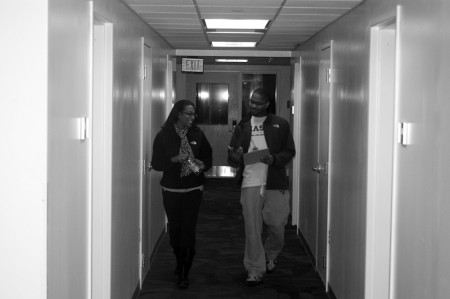
RAs Marcus Wyche, a senior majoring in computer science, and Breauna Johnson, a senior majoring in communications, perform rounds early Sunday morning in Shenandoah. Photo By Gregory Connolly
Students screaming down the halls, playing loud music at all hours of the night, running rampant around campus. This is what life might be like if there was no one keeping things in order. This is why we have resident advisors.
Too often, students do not appreciate the services and security that the many RAs on campus provide, including maintaining order, hosting hall get-togethers and being a mediator in times of interpersonal conflict.
“I love being able to help people,” said Missy Isaacs, a senior English major and returning RA in Liberty Square. “It’s great for person-to-person interactions.”
Isaacs has had plenty of experience with students. One of the strangest things she has seen during rounds?
“Residents smoking hookah in their room with the door open,” she said. “I couldn’t believe it.”
There is at least one RA placed on each floor of every residence hall on campus, with the exception of the student apartments, where there is one RA per building.
Michelle Hughes is a senior global affairs major and a first year RA in Dominion Hall. She said she has learned to balance her life, classes and RA responsibilities.
“[The] first and foremost priority is that I’m a person, then a student and then an RA,” Hughes said. “Student and person come first, though they trust me to balance my duties as an RA or else I wouldn’t have been hired.”
RAs go through a week-long training period that includes explanations of protocol and other situational issues. Because RAs work so closely with students, they are required to be prepared for many different situations.
“Training to be an RA was intense. They very believably reenact any situation you could encounter. It was everyday for a full week for at least eight hours a day. Close to 60 hours of training,” Hughes said. “We have such a strong support system that I’ve never felt unable to handle a situation … with all our official shifts laid out, we are here as a resource to students 24/7 regardless of shift or not.”
RAs also have continued agency throughout the semester, including the required University 300 class. This class is designed to help support RAs and build community among their numbers.
Isaacs said she puts in around 20 hours each week, depending on what she has to get done for her floor.
“Some weeks we make new bulletin boards or decorations so that would be more hours,” she said.
Students say that their experiences with their RAs have for the most part been positive.
“There are two types of people in this world: those that lead by example and those that let the power get to their head. The former seem to be good RAs,” said Julie Huffman, a senior double major in conflict analysis and resolution and global affairs. “They give you every opportunity to thrive and be your own person while also maintaining balance on the floor.”
Isaacs suggests that one of the best lessons she has learned from becoming an RA is “knowing that I’m part of a team. If I don’t put in my whole effort then it hurts the community.”
“As a returning RA, I am able to help the new RAs and really be there for them,” Isaacs said. “It’s like a little RA family.”
Having so much responsibility as well as being a student can be stressful for many RAs, but being able to balance these responsibilities is part of the job.
“Being an RA is a constant responsibility, whether or not I have final exams tomorrow, an emergency in the family or extracurricular commitments,” said Jack Hardy, a second semester RA and junior accounting major. “Although we are students first and resident advisors second, our residents will perpetually have needs and issues. Furthermore, we are role models on and off the floor and must constantly be accountable for our actions.”
There is a strong call from RAs for students to communicate what they want to do for floor activities. After all, it is the students’ housing money that is being spent on these events.
“We have a fund, which comes out of the money you pay for housing,” Isaacs said. “That’s why it’s really important to let your RA know what you want to do because it’s really your money that’s being spent.”
“We are required to get 15 percent of our residents to attend CORE programs [programs based on community, opportunity, reflection or environment] and 25 percent of our residents to attend our social events,” said Hardy. “However, there is some flexibility in the attendance requirements for our programs and we are encouraged to create more than three programs to build community on our floors.”
For students who are thinking about applying to become an RA, Isaacs offers some advice. “Do it. It’s the best experience you’ll have in college. You meet some amazing people and it will stick with you forever.”






Comments